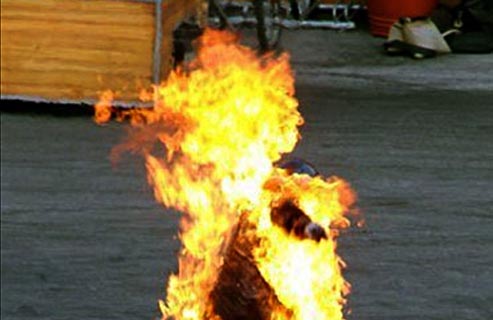
Arab Revolution "Arab Spring"
I remember very well when it all started, it all began when “Mohammad Bouzizi” a fresh produce cart vendor set himself on fire on December 17th 2010 in Tunisia, because he was publicly humiliated and harassed for no reason from a police woman. And since then protests outrboke in Tunisia, and became a trend in Arab countries including Jordan, where I’m from. As a result of Bouzizi’s actions, Arab citizens realized the oppression they are under, and started a revolution named the “Arab Spring” aiming to overthrow non-democratic, oppressive governments and leaders. It was called the “Arab Spring” considering the metaphoric political seasons; where winter signifies oppression and spring signifies the awakening of citizens and opening the path to achieving a long lost dream “freedom”.

Bouzizi on Fire
And, today while studying at the University of British Columbia, my colleagues Summer and Jojo gave a presentation on the “Arab Spring” in our Journalism class, which gave me a new perspective to look at it from. They defined the “Arab Spring” as : a revolutionary wave of demonstrations and protests occurring in the Arab world that began on December 18th 2010.
Media and technology played a big role in leading the revolution. Twitter, Facebook and Blogger; they are the face of the “Arab Spring”. Social media became the craze across the Arab world. It was significant in fueling the revolution and supporting it, it mobilized protests, helped in planning them, aided in undermining the regimes’ legitimacy, and increased national and international exposure of what was happening. However, the governments also used technology and the internet to track IP addresses of internet activists in order to suppress them and to suppress their actions. This resulted in their imprisonment and torture of citizens. Governments and Arab dictators also managed to monitor the protests and censor posts and stories on the internet. I believe that they use IT technologies sold by internet/technology companies in North America, if Americans stop selling these tracking programs to Arab governments, then there would have been less blood shed and less police – citizen involvements.

Arab Dictators
It is said that due to the Arab Spring an increase of 1,825.3% occurred in the internet usage of citizens in the middle east. Arab citizens are not only using social media for the purpose of socializing they are now using it as political tool, critiquing governments, presidents, kings and cabinet members. I believe that this media revolution has changed and improved many aspects in the Middle East, who ever knew that social media could fuel democracy?
– Farah Albashir
